Profile

Urmitapa Dutta
Birth:
1981
Training Location(s):
PhD, University of Illinois at Urbana-Champaign (2012)
MA, University of Delhi (2005)
Hons. BA, Lady Shri Ram College for Women, University of Delhi (2003)
Primary Affiliation(s):
Associate Professor, Department of Psychology, University of Massachusetts Lowell (2018–Present)
Visiting Scholar, Women’s and Gender Studies Department, University of Michigan Ann Arbor (2019–2020)
Psychology’s Feminist Voices Oral History Interview:
Career Focus:
Community-based research; structural violence; intersectionality; gender justice; decolonial feminist psychology
Biography
Dr. Urmitapa Dutta's journey into psychology and feminist activism was profoundly influenced by her upbringing in Northeast India, a region marked by its complex socio-political dynamics and history of ethnic conflict. Her formative years were shaped by the dualities of a society that, on one hand, had strong matrilineal influences, yet on the other hand was still deeply entrenched in patriarchal norms. Her mother played a pivotal role in nurturing her feminist consciousness, teaching her to question traditional structures and encouraging a critical examination of gender roles and societal expectations.
Dr. Dutta attended the Lady Shri Ram College for Women, University of Delhi, where she pursued an undergraduate degree in Psychology. Her interest in psychology was piqued by the lack of mental health resources in her hometown and the societal stigma surrounding mental illness. A particular incident involving a young woman labeled as 'mad' after a traumatic event left a lasting impression, driving her to explore psychology as a means to understand and create spaces for healing and identity formation.
After completing her undergraduate studies, she continued to a master’s program in Clinical Psychology at the University of Delhi. It was during this time that she began to critically engage with the limitations of traditional therapeutic models, recognizing the necessity to address structural inequalities and cultural contexts in mental health care. Her clinical work in Delhi exposed her to the disparities in access to mental health services, particularly for those from socio-economically disadvantaged backgrounds, further fueling her commitment to community-based approaches.
Dr. Dutta's pursuit of a Ph.D. in Clinical-Community Psychology from the University of Illinois at Urbana-Champaign marked a turning point in her career. Here, she embraced a decolonial feminist framework, seeking to integrate her experiences and insights from Northeast India with broader academic discourses on community psychology. Her doctoral work emphasized the importance of contextualizing psychological research within the lived realities of marginalized communities, challenging the dominant narratives and methodologies prevalent in Western psychology.
As a faculty member, Dr. Dutta has continued to champion these principles, both in her teaching and research. Her work focuses on decolonial feminist psychology, structural violence, and community resistance, often utilizing participatory action research to engage with communities facing systemic oppression. She is particularly interested in how everyday violence and resistance manifest in culturally specific ways and the role of storytelling in fostering healing and empowerment.
Dr. Dutta’s s psychological work and lens is decolonial and feminist. She defines Decolonial Feminist Psychology as an approach that fundamentally contests and dismantles entrenched binaries and hierarchies established by colonialism. For her, this means breaking down not only gender binaries but also those between the Global South and Global North, mind and body, and center and periphery. Decolonial Feminist Psychology seeks to reimagine and redefine these relationships, promoting a way of being that is not dictated by these structures. It is about recognizing the interconnectedness of various forms of oppression and working towards a praxis that reflects the world we aspire to create—one that is free from imperialist and neoliberal constraints.
Dr. Dutta’s commitment to social justice extends beyond academia. She collaborates with various groups, including grassroots organizations in Northeast India focusing on gender justice and structural violence. She is involved with collectives like the Amrapari Rural Women’s Cooperative and is dedicated to empowering women. Her dedication to epistemic justice is both theory and praxis, as further demonstrated by her co-creation of collaborative spaces such as the Miya Community Research Collective, and the Decolonial Research Collective, a group “committed to (co)building intentional communities of care and epistemic resistance” (see link to her website above). Dr. Dutta has also been engaged in transnational solidarity work, including advocacy for Palestinian liberation. Her involvement with various feminist and activist collectives underscores her belief in the power of community and collective action to drive meaningful change.
Through her teaching, Dr. Dutta seeks to inspire her students to critically engage with the world around them, encouraging them to question and dismantle oppressive structures. Her pedagogical approach is rooted in creating inclusive spaces that support the diverse experiences and voices of her students, particularly those from marginalized backgrounds.
Reflecting on her path in psychology to date, Dr. Dutta emphasizes the importance of community and relationality in her work. She acknowledges the challenges she has faced as a woman of colour in academia, navigating spaces that often feel alienating and exclusionary. Yet, it is the connections and solidarity she has found with others who share her vision of a more just and equitable world that continue to sustain and inspire her work.
Urmitapa Dutta's accomplishments so far are a testament to her dedication to transforming psychology into a discipline that not only critiques but actively resists
colonial and patriarchal legacies.
by Aaron Peniston (2025)
To cite this article, see Credits
Selected Works
Dutta, U. (2016). Prioritizing the local in an era of globalization: A proposal for decentering community psychology. American Journal of Community Psychology, 58(3–4), 329–338. https://doi.org/10.1002/ajcp.12047
Dutta, U. (2017). The everyday and the exceptional: Rethinking gendered violence and human rights in Garo Hills, India. In S. Grabe (Ed.) Women’s human rights: A social psychological perspective on resistance, liberation, and justice. (pp. 179–204). New York, NY: Oxford University Press. https://doi.org/10.1093/oso/9780190614614.001.0001.
Dutta, U., Azad, A. K.*, Mullah, M.*, Hussain, K. S.*, & Parveez, W.* (2022). From rhetorical “inclusion” toward decolonial futures: Building communities of resistance against structural violence. American Journal of Community Psychology, 69(3–4), 355–368. https://doi.org/10.1002/ajcp.12561
Dutta, U. (2024). Dismantling the master's house: Toward epistemologies of resistance and freedom dreaming. Psychology in Society, 66(2), 3–25. https://doi.org/10.57157/pins2024Vol66iss2a6717
Photo Gallery

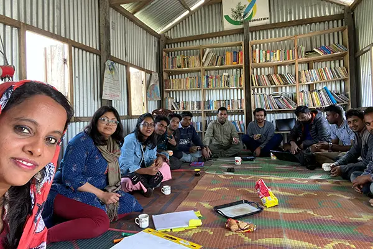
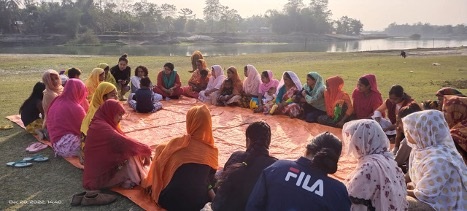
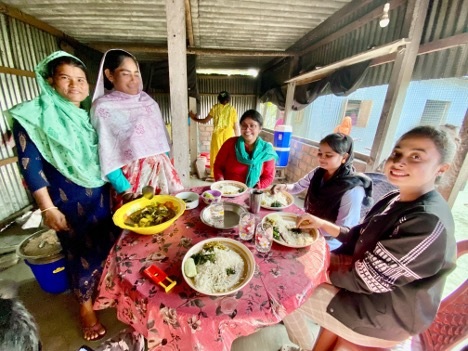
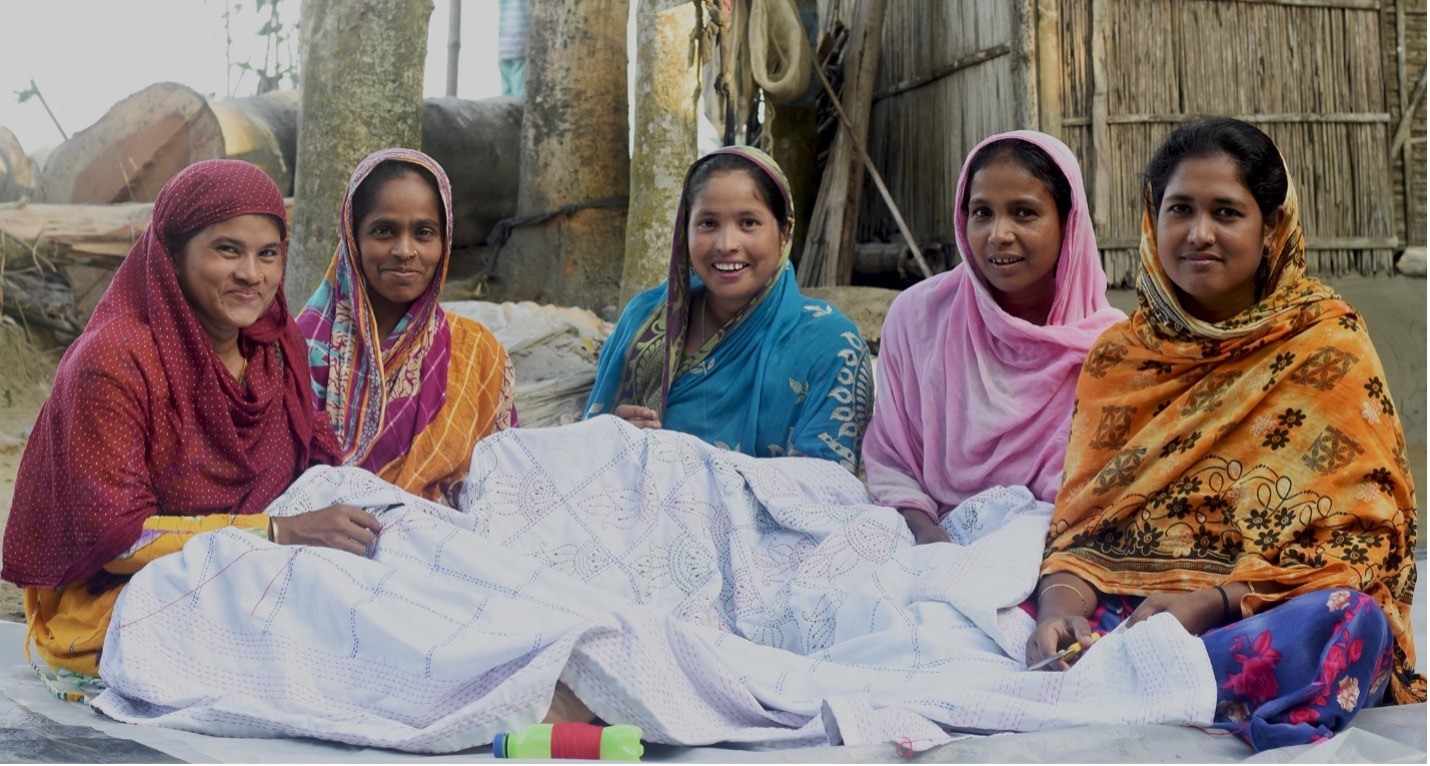
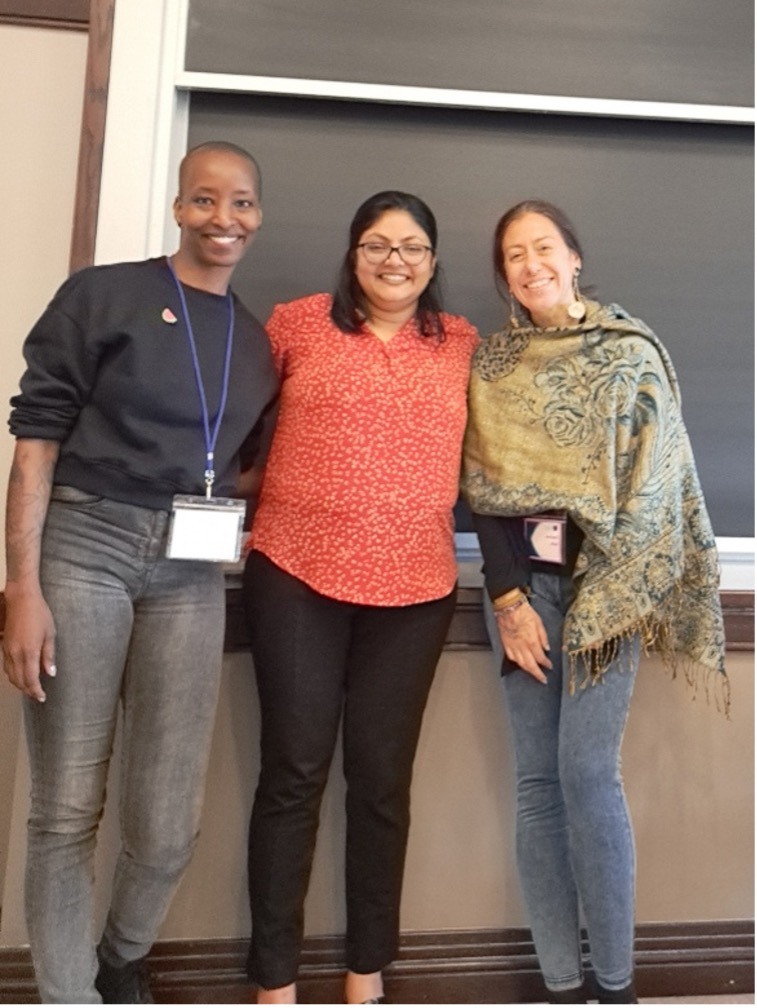
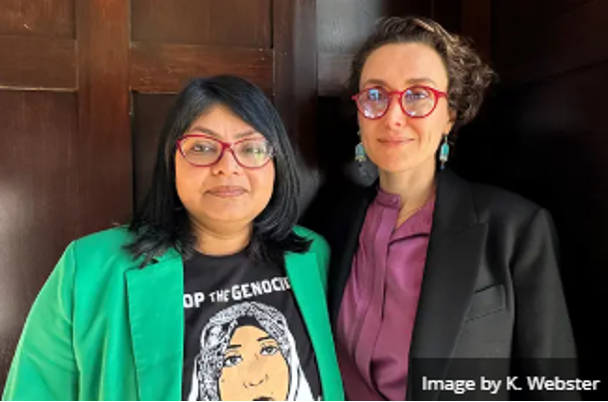
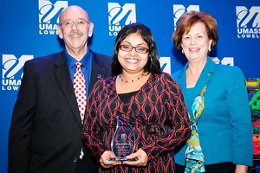
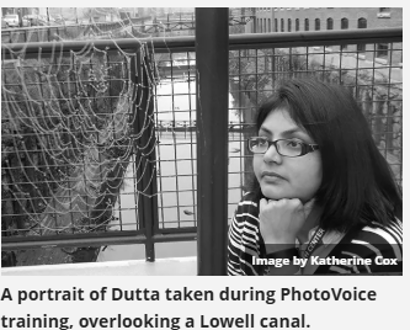
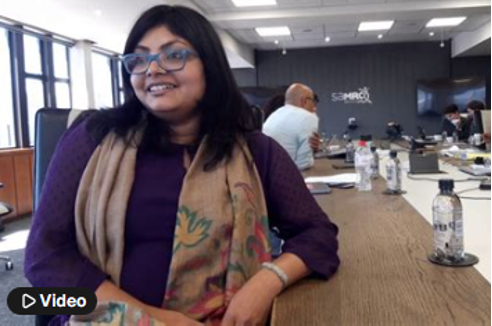

Urmitapa Dutta
Birth:
1981
Training Location(s):
PhD, University of Illinois at Urbana-Champaign (2012)
MA, University of Delhi (2005)
Hons. BA, Lady Shri Ram College for Women, University of Delhi (2003)
Primary Affiliation(s):
Associate Professor, Department of Psychology, University of Massachusetts Lowell (2018–Present)
Visiting Scholar, Women’s and Gender Studies Department, University of Michigan Ann Arbor (2019–2020)
Psychology’s Feminist Voices Oral History Interview:
Career Focus:
Community-based research; structural violence; intersectionality; gender justice; decolonial feminist psychology
Biography
Dr. Urmitapa Dutta's journey into psychology and feminist activism was profoundly influenced by her upbringing in Northeast India, a region marked by its complex socio-political dynamics and history of ethnic conflict. Her formative years were shaped by the dualities of a society that, on one hand, had strong matrilineal influences, yet on the other hand was still deeply entrenched in patriarchal norms. Her mother played a pivotal role in nurturing her feminist consciousness, teaching her to question traditional structures and encouraging a critical examination of gender roles and societal expectations.
Dr. Dutta attended the Lady Shri Ram College for Women, University of Delhi, where she pursued an undergraduate degree in Psychology. Her interest in psychology was piqued by the lack of mental health resources in her hometown and the societal stigma surrounding mental illness. A particular incident involving a young woman labeled as 'mad' after a traumatic event left a lasting impression, driving her to explore psychology as a means to understand and create spaces for healing and identity formation.
After completing her undergraduate studies, she continued to a master’s program in Clinical Psychology at the University of Delhi. It was during this time that she began to critically engage with the limitations of traditional therapeutic models, recognizing the necessity to address structural inequalities and cultural contexts in mental health care. Her clinical work in Delhi exposed her to the disparities in access to mental health services, particularly for those from socio-economically disadvantaged backgrounds, further fueling her commitment to community-based approaches.
Dr. Dutta's pursuit of a Ph.D. in Clinical-Community Psychology from the University of Illinois at Urbana-Champaign marked a turning point in her career. Here, she embraced a decolonial feminist framework, seeking to integrate her experiences and insights from Northeast India with broader academic discourses on community psychology. Her doctoral work emphasized the importance of contextualizing psychological research within the lived realities of marginalized communities, challenging the dominant narratives and methodologies prevalent in Western psychology.
As a faculty member, Dr. Dutta has continued to champion these principles, both in her teaching and research. Her work focuses on decolonial feminist psychology, structural violence, and community resistance, often utilizing participatory action research to engage with communities facing systemic oppression. She is particularly interested in how everyday violence and resistance manifest in culturally specific ways and the role of storytelling in fostering healing and empowerment.
Dr. Dutta’s s psychological work and lens is decolonial and feminist. She defines Decolonial Feminist Psychology as an approach that fundamentally contests and dismantles entrenched binaries and hierarchies established by colonialism. For her, this means breaking down not only gender binaries but also those between the Global South and Global North, mind and body, and center and periphery. Decolonial Feminist Psychology seeks to reimagine and redefine these relationships, promoting a way of being that is not dictated by these structures. It is about recognizing the interconnectedness of various forms of oppression and working towards a praxis that reflects the world we aspire to create—one that is free from imperialist and neoliberal constraints.
Dr. Dutta’s commitment to social justice extends beyond academia. She collaborates with various groups, including grassroots organizations in Northeast India focusing on gender justice and structural violence. She is involved with collectives like the Amrapari Rural Women’s Cooperative and is dedicated to empowering women. Her dedication to epistemic justice is both theory and praxis, as further demonstrated by her co-creation of collaborative spaces such as the Miya Community Research Collective, and the Decolonial Research Collective, a group “committed to (co)building intentional communities of care and epistemic resistance” (see link to her website above). Dr. Dutta has also been engaged in transnational solidarity work, including advocacy for Palestinian liberation. Her involvement with various feminist and activist collectives underscores her belief in the power of community and collective action to drive meaningful change.
Through her teaching, Dr. Dutta seeks to inspire her students to critically engage with the world around them, encouraging them to question and dismantle oppressive structures. Her pedagogical approach is rooted in creating inclusive spaces that support the diverse experiences and voices of her students, particularly those from marginalized backgrounds.
Reflecting on her path in psychology to date, Dr. Dutta emphasizes the importance of community and relationality in her work. She acknowledges the challenges she has faced as a woman of colour in academia, navigating spaces that often feel alienating and exclusionary. Yet, it is the connections and solidarity she has found with others who share her vision of a more just and equitable world that continue to sustain and inspire her work.
Urmitapa Dutta's accomplishments so far are a testament to her dedication to transforming psychology into a discipline that not only critiques but actively resists colonial and patriarchal legacies.
by Aaron Peniston (2025)
To cite this article, see Credits
Selected Works
Dutta, U. (2016). Prioritizing the local in an era of globalization: A proposal for decentering community psychology. American Journal of Community Psychology, 58(3–4), 329–338. https://doi.org/10.1002/ajcp.12047
Dutta, U. (2017). The everyday and the exceptional: Rethinking gendered violence and human rights in Garo Hills, India. In S. Grabe (Ed.) Women’s human rights: A social psychological perspective on resistance, liberation, and justice. (pp. 179–204). New York, NY: Oxford University Press. https://doi.org/10.1093/oso/9780190614614.001.0001.
Dutta, U., Azad, A. K.*, Mullah, M.*, Hussain, K. S.*, & Parveez, W.* (2022). From rhetorical “inclusion” toward decolonial futures: Building communities of resistance against structural violence. American Journal of Community Psychology, 69(3–4), 355–368. https://doi.org/10.1002/ajcp.12561
Dutta, U. (2024). Dismantling the master's house: Toward epistemologies of resistance and freedom dreaming. Psychology in Society, 66(2), 3–25. https://doi.org/10.57157/pins2024Vol66iss2a6717










